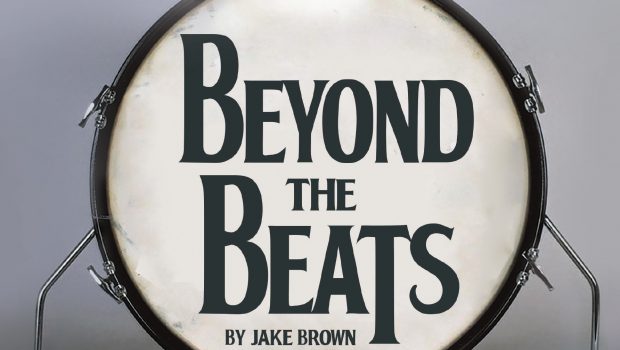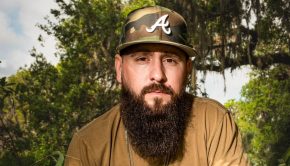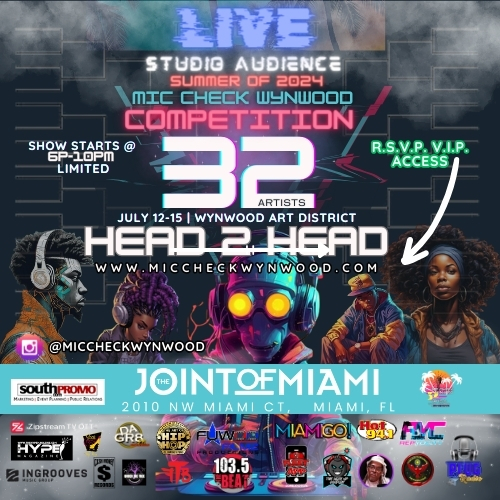“Beyond The Beats” Author Jake Brown On His New Book, Drumming & More
Nashville-based author Jake Brown has created a niche for himself, to say the least. He has written dozens of published books, both in collaboration with multi-platinum musicians and about people behind seminal recordings. The guy always has multiple projects — often releasing several books in a calendar year — often leading people to wonder when he finds time to sleep or do laundry.
Beyond The Beats is the latest book from Brown, as focused on rock drumming. Among the drummers interviewed by Brown for the book were the drummers of Aerosmith, Motley Crue, Bon Jovi, Metallica, Jane’s Addiction, Creedence Clearwater Revival, Journey, Smashing Pumpkins, Guns N’ Roses and the Red Hot Chili Peppers. Within these exclusive interviews, Brown explores areas that drummers will find interesting, but also discusses plenty on non-musician-friendly topics.
I spoke with Jake Brown on behalf of The Hype Magazine, and highlights from our Q&A are below. For more info on his books, Brown can be followed on Twitter via @JakeBrownBooks.
Had a great shoot this past Sept in L.A. with Entertainment One for B.E.T.'s The Death Row Chronicles, Airing Spring 18 pic.twitter.com/y43VIHdDJV
— Jake Brown (@jakebrownbooks) December 7, 2017
When did you start playing drums?
Jake Brown: Wow, okay, so I’m purely an ear player, and grew up playing to the guys in this book, literally. I actually play five instruments — guitar is my primary now — but I started out on violin in the first grade, then piano in 2nd grade, and my grandfather Armand Thieme — who did clowning in his retiree years — gave me my first bass drum and floor tom in 6th grade that he got in doing that. From there, I started banging along in the basement on those two drums to Prince and Motley Crue records — Tommy Lee was/is still my favorite drummer of all time — and by 10th grade, worked my way into a full drum set in 10th grade. From there, again, pretty much taught myself by playing along to the guys in this book.
Bands like Jane’s Addiction, The Smashing Pumpkins and the Red Hot Chili Peppers were enormous influences in high school, and we all grew up on CCR and Guns N Roses and Bon Jovi on MTV. Being a child who grew up primarily in the 1980s, I — like everybody — was raised on radio with bands like Journey and John Mellencamp, especially growing up in the midwest. My parents were really cool about me going to concerts from like 6th grade on instead of movies on the weekends. In fact my mom took me to see Bon Jovi’s Slippery When Wet show and my dad used to take us to John Mellencamp during The Lonesome Jubilee. But I got lucky enough to see all these guys play live growing up, which had a huge visual influence too, because I was always watching the drummers. Then in high school, college and my proverbial L.A. band right out of college that never went anywhere, I was always the drummer.
Did writing this book at all change you as a drummer? Or even how you view drumming?
Jake Brown: After writing books with bands for 17 years, it clarified my opinion that drummers have long been under-appreciated for just how many hats they wear at once in the course of a performance. From driving the pulse of both the band and audience at the same time, while simultaneously having to pull off incredibly technical performances and still be entertaining as a showman, and that’s just live. Remember, if a drummer misses a beat during a live concert versus a guitar player missing a lick, the audience is going to tend to notice the drummer first and foremost. They just have this invisible spotlight on them at all times, it’s an incredible responsibility and they have to make it look like they do it effortlessly night after night!
I thankfully have a catalog of over 40 published books where I specialize almost exclusively in these kinds of behind-the-scenes anthologies where, whether it’s my Nashville Songwriter book series — where we profile all of country music’s hit songwriters — or Behind The Boards where I talk to record producers, or In The Studio which has 15 books I’ve co-written with everyone from Heart, Motorhead, Tupac Shakur (with the estate), Rick Rubin, Prince, etc., they all focused on the creation of their catalogs of hits/albums. I wanted to do the same with the biggest drummers in rock & roll.
So the concept was to talk about everything from who first put the sticks in their hands and sat them down behind the kit as a kid to the inspiration behind their most famous beats, to really create a holy grail of sorts for rock and metal drummers of any generation. This book features the stories behind hundreds of their favorite beats, whether the reader is a fan streaming his favorite hits by each band while reading along to how they were created in the studio or a young drummer learning how to play each song by these superstar hitters.
You get the stories of each of these guys’ real lives, and at the same time, the book is written to give kids aspiring to be a rock & roll/professional drummers a real picture into how hard the work is. From hauling around a kit vs a guitar, having a car to transport kit, a place to practice, the importance of getting out and playing with other musicians as early on as possible, along with practicing at home alone — popularly playing along to favorite drummers’ records to learn along to — the importance of playing before audiences. Even if its backyard parties and talent shows, or even the school band, etc.
Check out my Dec 17 Article in Tape Op w the legendary MIKE DEAN https://t.co/NauS28LLGB #tapeop via @tapeopmag
— Jake Brown (@jakebrownbooks) December 7, 2017
How long did it take to write the book?
Jake Brown: I first got the idea for this book series writing Kenny Aronoff’s memoir with him back in 2014. I’d met Kenny through the Strange Beautiful Music memoir I co-wrote with Joe Satriani in 2013, and then once I started interviewing Kenny for his book, he wanted me to get commentary from several peers who grew up on his style. Next thing I knew I was talking to Stephen Perkins of Jane’s Addiction, another of my childhood heroes, Chad Smith of the Red Hot Chili Peppers — who I had a bit of a previous rapport with — and Taylor Hawkins from the Foo Fighters. I had so much cool material from Kenny that he was cool with doing a chapter, too.
So the first guy I pitched the idea to was Chad, and once he signed on, Stephen Perkins signed on, and then Taylor. Then I started testing the waters outside of my contact zone and reached out to Aerosmith and Metallica’s management and both Lars Ulrich and Joey Kramer signed on. Which let me know there was something to this because these guys hadn’t ever been interviewed for a book like this about drummers, which gave it more momentum, and then Creedence Clearwater Revival’s drummer, Doug Cosmo Clifford said “yes.” I reached out to Tommy Lee and he signed up, so I just kept reaching out to all the guys who were my core influences growing up, and Tico Torres from Bon Jovi and Matt Sorum from Guns N’ Roses signed on, and I had the chance to interview Jimmy Chamberlin as part of a Tape Op story I was writing with Billy Corgan about the Smashing Pumpkins catalog, and then Journey’s drummer Steve Smith came aboard. So at that point I felt we had a really strong opening ball.
Was the plan all along to start the book with Tommy Lee?
Jake Brown: YEP, so this is a funny story to me. My babysitter when I was in grade school couldn’t have certain records at her house because her parents were super-strict, so she kept them at our house and so at like 9, 10 I had access to Van Halen’s 1984, Motley Crue’s Shout At The Devil and Prince’s Purple Rain, and those became my three core influences as a kid, so Tommy’s beats have been in my head since I was like 7, 8 years old. He’s the foundation of why I play drums and so many other kids who grew up in my generation. He was our John Bonham or Keith Moon growing up, from watching him live in that video for “Wild Side” at 11 years old rising over the crowd in that rotating drum cage while playing to just his energy behind the kit.
Then when I started seeing Motley Crue live in junior high and the 11 times since I have never not been entertained on some new level by him. He just always is pushing the boundaries of rhythm, and whether it’s “Kickstart My Heart” and “Dr. Feelgood,” all the way back to “Shout at the Devil” and “Too Fast For Love” or “Live Wire,” it was such a cool thing to have him open up this much about his singular playing style.
Which interview was the hardest one to get? Or at least took the longest to schedule?
Jake Brown: (laughs) Stewart Copeland of the Police for book II. I built up a pretty heavy arsenal of peers before he said “yes,” and I approached his camp several times. I was BLOWN away though at how early Joey Kramer of Aerosmith and Lars Ulrich of course of Metallica said yes, that was real fuel for the book to then interest other drummers who dug the concept, but I think wanted to see that it had the interest of their peers first.
This book is really written by these drummers in a sense, with as much as they opened up, which was another honor because some of these guys talked me to 3, 4 hours. If you read the average band magazine interview, the drummer gets 1, 2 paragraphs at the most usually, so I gave them all my word that we’d talk as long and as in depth as they wanted about everything from jazz roots to side projects that they wanted to talk about, along of course with their signature bands/hits, etc. It was definitive.
https://t.co/IW25quk3ZK #tapeop via @tapeopmag I wrote this story with Billy Corgan, it just was published yesterday by TAPE OP, ths Larry!
— Jake Brown (@jakebrownbooks) September 24, 2016
Was there a highlight for you of writing the book?
Jake Brown: Just the chance to bring these beatsmiths front and center, and hopefully help highlight how key performances like Kenny Aronoff’s on “Hurts So Good” or “Jack & Diane,” or Joey Kramer’s opening beat to Aerosmith’s “Walk This Way” or Tico Torres’ on Bon Jovi’s “Livin’ On A Prayer,” or “You Could Be Mine” by Guns N Roses, “Down On The Corner” by CCR, or “Don’t Stop Believin’” by Journey, the list of hits goes on and on. These guys impart so many great lessons for readers who are or who might be thinking about picking up the sticks. Everything from studio playing with the importance of the click track, or of creating feel within a performance, or the concept of less is more when coming up with parts. It really covers all the bases and that was very important to me to try and give as 3-D — if you will — a look at what it’s really like to be a drummer in these superstar bands for decade after decade.
So do you have another book in the works at the moment?
Jake Brown: There’s actually two more volumes of the book planned because it kept snowballing. Vol. II comes out in 2019, and has already-completed interviews with the drummers of The Police, of The Clash, Iron Maiden, Stevie Ray Vaughan and Double Trouble, Bad Company, Free, Dream Theater, Carmine Appice, Steve Gadd (Simon & Garfunkel, Eric Clapton), MC5, Dino Danelli of The Rascals, Ozzy Osbourne, Slayer, The Pixies, Chicago, Montrose, Heart, Whitesnake, Lynyrd Skynyrd, Tower Of Power, Santana, Primus, John Lennon, and YES. Vol. III will feature all the big female drummers in Rock & Roll — which comes out in 2020 — so hopefully it will be a really-rounded series by the time it’s done.
Any other projects you can talk about?
Jake Brown: PLENTY. I write several books a year, so thank you for asking as they range all over the stylistic map. As a biographer, you are making an on-spec — meaning writing for free up front until the book is sold — commitment to writing an anthology series like this, so I’m always interviewing for multiple projects and transcribing — the bane of my professional existence — interviews for different upcoming books.
Next up is the second volume in my Nashville Songwriter book series, and we’re wrapping work on country rap pioneer/superstar Big Smo’s memoir, and I have spent the bulk of the spring interviewing the biggest country music producers around town here where I live in Nashville for the third installment of the record producers series I write, this one titled Behind The Boards: Nashville. I also have Mopreme Shakur’s book coming next year — Tupac’s brother — plus new jack swing producer Teddy Riley’s memoirs — which we’ve been writing since 2014 — and these next two volumes of Beyond The Beats.
When not busy with work, how do you like to spend your free time?
Jake Brown: (laughs) In the music business, you’re only as relevant with readers as what you have out now or coming out, so I work around the clock and don’t have much free time. But when I’m not working on books, I’m in the recording studio. I’ve been a songwriter my whole life, and have been lucky for the past 10 years to work with an amazing engineer, Aaron Harmon — who is out on the road with Blackbear right now and has his own signed band, BaseCamp — on a series of albums the first of which is being released this summer by my band The Nashville Suns. It’s called Midnight Show, and I write/play/produce/perform everything on those records, and actually before that, our first EP comes out, I wrote it about my dog Hannie who passed this past spring. That’s called Catching Carrots On The Clouds. So making music and writing about music and interviewing musicians and producers is pretty much how I spend my time.
Check out Oct 17 Tape Op interview with Motley Crue/Metallica/The Cult production wizard BOB ROCK! https://t.co/gzE35jQs8H #tapeop via @tapeopmag
— Jake Brown (@jakebrownbooks) December 7, 2017
What was the last concert you attended for fun?
Jake Brown: Most of the stuff I see is for work these days, but I have still had a blast at that. I saw the Smashing Pumpkins at the Ryman — the real Grand Old Opry, for anyone who hears otherwise – and that was cool because Billy [Corgan] gave me those tickets for my birthday, and that’s my favorite venue in Nashville in the 15 years I’ve lived here. I’ve seen everyone there from Tom Waits and Cheech & Chong to Bill Maher and Squeeze, The Pixies, The Black Crowes, Indigo Girls, even HEART, who I wrote a book with about 10 years ago, so that was cool. And DRUMS sound amazing in that place! It’s an old church, the coolest music venue on earth as far as I’m concerned. Definitely recommend checking it out if you pass through Nashville.
Finally, Jake, any last words for the kids?
Jake Brown: (laughs) I don’t usually do advice questions because it’s so much better dispensed by the people I interview usually, but I’m in my 40s now, so I have the benefit of 20 years working full-time in the record business to offer the following, I guess. Only get into the entertainment business — from ANY aspect — if you’re REALLY willing to work hard to get there and stay there. The better you do, the harder it gets, and that’s because its cut-throat competitive.
Build as much catalog as you can as quickly as you can, whether you’re a drummer new to town, take as MANY live gigs and much session work as you can get, no matter whose record it is or if it’s your style or not, the more diverse you are the more work you’ll get. If you’re a sound engineer, take any session you can work on, record any band or artist you can, learn to work live sound, just be a utility to those around you and, as a player, LEARN TO READ music, period. Network A LOT, and as this was hammered home over and over and over in this book, play with as many other musicians as you can, no matter whether you’re a drummer doing different live gigs on different nights of the week or a songwriter writing with different writers every day and playing writers rounds when you can at night.
There’s no such thing as an easy road to get to or stay working in the record business, period. So while work ethic isn’t a very “romantic” word, but it’s the key to succeeding at anything, especially in a business meant to look this easy.
Kicked off 2017 shooting Big Smo's interview for the forthcoming COUNTRY RAP RISING documentary, due in 2018 at his farm in Unionville, TN pic.twitter.com/Ab7ahbdAvl
— Jake Brown (@jakebrownbooks) December 7, 2017









































